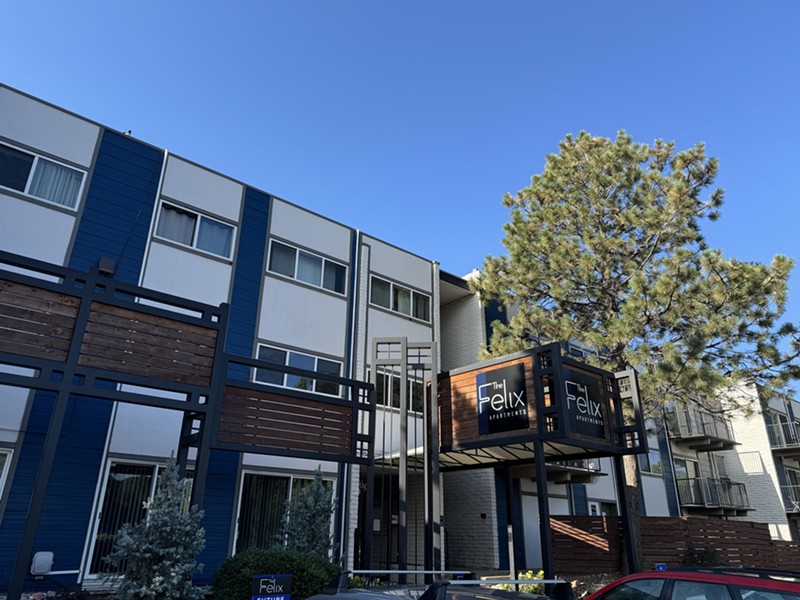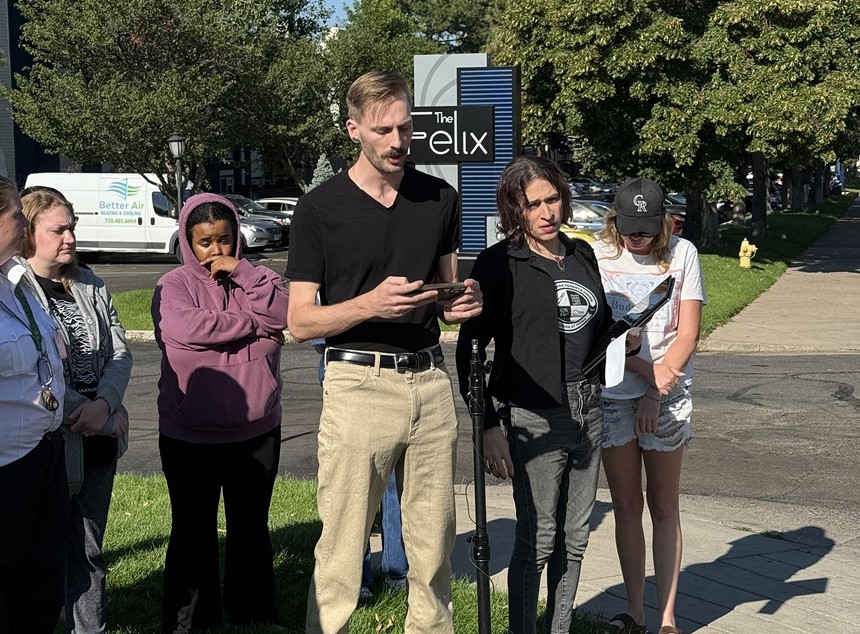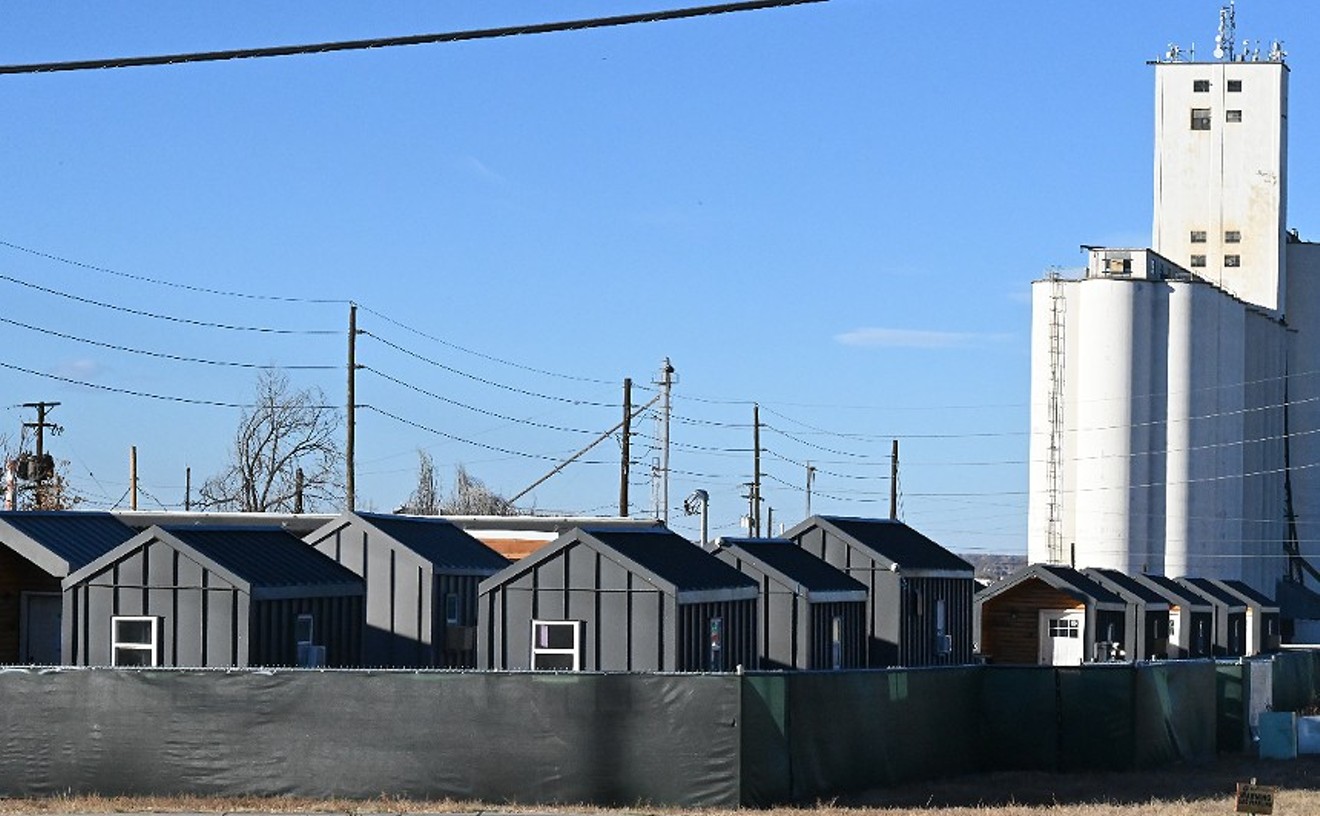Rental licenses are supposed to ensure that minimum housing standards for health and safety are met, including requiring working heat and hot water.
“I can tell you that there is no way the Felix was qualified to pass an inspection,” Benjamin Stark, a tenant, told media on August 12. “We still had over 100 units that didn't have hot water or heating. … Additionally, dozens of tenants reported holes in their walls and ceilings, missing windowpanes, rats and roaches, trash not being taken.”
The tenants unionized through the Denver Metro Tenants Union and are now calling for the Colorado Attorney General’s Office to investigate the inspector who gave the building a passing grade. They’re also questioning whether inspections for Denver's rental registry program are functioning properly across the city after identifying other buildings where the property passed an inspection while tenants reported numerous violations of Denver’s minimum housing standards.
Denver’s rental licensing program is only in its third year of existence after being approved by the city council in 2021. By the beginning of the year, all rental properties in Denver were supposed to be licensed, but only 23,035 properties of an estimated 50,000 have been licensed as of August 12, according to the Denver Department of Excise & Licenses. Of the 23,000, fewer than 6,000 are multi-family rental properties like the Felix.
According to Eida Altman, organizing director of DMTU, the program isn’t meeting its goal of basic health and safety standards, even in properties that have complied with licensing laws.
“One reason is the lack of seriousness around third-party inspections properties must undergo to receive a license,” Altman says in a statement. “Landlords pick and pay their inspectors without program oversight or quality control. The result is predictable.”
At the Felix, tenants believe Hasso Fleming Schutrumpf was directed to inspect only the most functional units by management.
According to Excise & Licenses, 10 percent of the units at a property must be inspected, and those units are meant to be chosen at random by inspectors. Tenants contend that if that were the case, the property would not have passed an inspection, as an April investigation conducted by the Denver Department of Public Health & Environment found fourteen violations of housing standards and almost fifty individual examples of problems in units or common areas of the property.
Additionally, DMTU received the inspection report through a CORA request and noticed a “disproportionate” number of units examined by Schutrumpf were uninhabited.
One tenant at the Felix, Pernia Peña, remembers Schutrumpf inspecting her unit. At the time, she had no heat or hot water, but when she led Schutrumpf to the sink and air vents to demonstrate, she says she was ignored. Her unit was left out of the final inspection report submitted to the city.
Tenants are concerned about Schutrumpf's dedication to proper inspections because he questioned the point of Denver's rental registry in a YouTube video called How to Maneuver Denver's New Rental Licensing and Inspection Requirements.
“We as landlords see ourselves as providing a beneficial service to tenants, providing a home, but we're following the same workflow as a marijuana dispensary applicant or a strip club or a tobacco retailer or a liquor store would have to follow,” Schutrumpf said. “It feels a little like we're put into a category that I don't think landlords are part of. We actually provide benefits to society.”
In a separate YouTube video about Denver’s rental registry inspections, Schutrumpf said he sees the program as legislating “that everybody has a Mercedes-grade rental property.”
“It's going to create challenges where people who don't want to pay as much for a Mercedes can't really live in Denver anymore,” he said.
According to City Councilmember Stacie Gilmore, who championed the rental licensing program, the intent was to even the playing field between tenants and landlords while ensuring safe housing.
Passing Inspections but Failing Tenants
“When I look at my apartment, there's cockroaches in it,” says Felix tenant Blaire Moore. “There was a solid set of months where we didn't have heat in winter. We're certainly not in luxury apartments here. We're just looking for some basic assurance.”Many Felix residents say they have unsafe living conditions that should have raised questions for an inspector. Darimar Mendez has lived at the Felix for a year and says she has constantly dealt with mice and cockroaches.
Her dishwasher doesn’t drain correctly, which has caused water to accumulate behind her sink to the extent that an odor from the dirty water emanates through her apartment. She and her family have alerted management since last November, but management has not come to fix the problem.
“I have two little girls, and that polluting smell, because it is an unpleasant odor, it affects them more than anything else,” Mendez says. “They say that's not a priority and I have to wait. I've been waiting since last year.”
About four months ago, a water pipe broke, and Mendez's apartment was covered in ankle-deep water for a week. Although the water was cleaned up, the carpets were never changed, according to Mendez, who worries there is a fungus living there out of sight.
Mendez says she hopes a government entity will take notice. According to Moore, part of the reason the tenants want the attorney general to investigate is because lasting change is needed, and not just for the Felix.
Olivia Sanders of the East Colfax Community Collective, a community advocacy organization for the East Colfax area, spoke on August 12. Sanders shared that tenants at the 1345 Yosemite apartment property had similar problems with rats and water leaks from toilets that were never addressed. Sanders read out a testimony from tenants whose unit was listed in the inspection report for the property to gain its license but who never had an inspector actually come inside their apartment
When DMTU asked the city for records of who had inspected each property to try to discover if issues with certain inspectors like Schutrumpf are widespread, Excise & Licenses quoted $265,892, explaining that the information is not currently listed anywhere except in individual applications, which are currently stored as PDFs.
DMTU is also concerned because Nicole Kim, who is in charge of Denver's rental licensing program, appeared in a video with Schutrumpf where he was advertising his services as an inspector. In an email exchange with Westword, Excise & Licenses did not address either of DMTU's concerns.
“We recognize that licensing landlords won't eliminate all irresponsible landlords, but accountability for landlords in Denver is higher than ever,” the department says through spokesperson Chuck Hickey. “In year one of the full licensing requirement, we're already seeing a weeding out of landlords who care more about profit than people.”
Hickey cites the $88,536 in fines issued by the department for those who have neglected to get licenses as evidence.
Inspectors must be certified by the American Society of Home Inspectors and the International Code Council, which the city cites as evidence that inspections are high-quality. However, both the ASHI and the ICC confirmed that their organizations do not handle enforcement. Rather, they are voluntary professional organizations.
For the ICC, cities themselves are in charge of determining how often an inspector needs to reapply for a license and for determining how certifications are applied legally. Schutrumpf said in a YouTube video that the required certifications “seemed a little overkill for what we’re doing.”
Neither Schutrumpf nor Felix management responded to requests for comment.
“As for the Felix, it has a pending residential rental property application with us, but it has not yet been approved,” Hickey says. “We are working with our partners at the Denver Department of Public Health & Environment to resolve any public health concerns before issuing a license.”
The DDPHE has continued to visit the Felix and has ordered building management to contract with an engineer to evaluate the boiler system by August 19 to make sure it is “capable of adequately supplying heat and hot water to all occupants during peak times,” according to DDPHE spokesperson Amber Campbell.
Campbell says DDPHE hopes to bring the Felix into compliance with health regulations so it can be licensed. The city doesn't want to create a situation where enforcement leads to the displacement of residents.
“One of the challenges we're coming up against is, what do we do when we have a demonstrated bad actor in the property management space?” Danica Lee, director of the DDPHE’s Public Health Investigations Division, told Westword in May. “Because withholding a license from them or taking away a license, in theory, could eliminate a bunch of housing stock."
Altman says that on top of ensuring that properties are licensed, the city needs to take more steps to determine whether inspections are meaningful and accurately reflect building living conditions. DMTU believes intervention from the attorney general could further that goal and create a lasting benefit to tenants.
“The only time we get anything done is after we kick and scream, and it doesn't seem to last,” Moore says. “Eventually, there will come a point where our throats are too tired to keep screaming."













